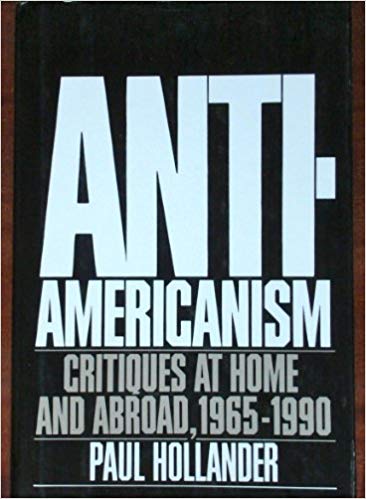This latest installment in Paul Hollander’s series of exposes of left-liberal thinking has a broader perspective than his previous work. His first book, Political Pilgrims, and subsequent writings focused on the affinity of Western liberals for communist states vis-a-vis the United States. Now, with the Cold War over and communism discredited, the real motive of these people is starkly visible: it was not so much a love for the communist bloc as it was hatred for the United States that drove the left, which embraced Marxism because it seemed to pose the most serious challenge to America. The failure of the Marxist system does not in any way lessen hostility to the American one; it only leads to a wider search for new alternatives that might prove more effective in deposing the United States as the leader of Western civilization. “Anti-Americanism” is the most accurate description of an ideology that is concerned far more with what it opposes than what it supports.
Here is the key to the many contradictions observable in leftist writings on particular issues. Leftists loudly proclaim the priority of the community over the individual, branding private property as antisocial and conspicuous consumption as harmful to the environment. Yet when the question is AIDS testing to protect public health, measures to apprehend and confine criminals (Jonathan Kozol deplores “prison cells for those—too few—who will not break”), the duty of citizens to provide for the common defense, or even the use of social pressure against deviate behavior, leftists become extreme libertarians. The element of consistency that runs through all these positions is the championing of anything that is at odds with mainstream society. The bulk of Hollander’s book deals with statements by a wide variety of leftists who loathe every aspect of American life. This makes Hollander’s book a great reference work, even though it is organized mainly by source (Church, Higher Education, Media, Western Europe, etc.) rather than by topic.
Hollander is less satisfying when he tries to explain why radicals feel as they do: the counterculture seems simply too alien to him. The central leftist indictment from which subsidiary ones derive he terms “inauthenticity.” “American society,” he writes, “as experienced by the critics is permeated by falsehood, hypocrisy, pretense. Nothing is genuine, original or trustworthy . . . there is a substantial gap between the way things are supposed to be and the way they really are, a discrepancy between ideals and reality, theories and practices, inspirations and achievements.” Hollander quotes Christopher Lasch as saying, “the moral bottom had fallen out of our culture,” a diagnosis for which he has sympathy. “I can understand that the openness, the freedoms and the moral-ethical free-for-all characteristic of American society and culture can be troublesome and burdensome . . . lacking in solid structures and necessary limitations.” The left has made good use of this insight in its campaign to subvert the churches, and many conservatives echo the indictment (the right also being a dissident movement).
The left places the entire blame on capitalism, which it takes as a synonym for modernity, and many critics on the right also fault modern capitalism as it is defended by libertarians, who not only claim preeminence for “the market” over all other aspects of life but preach a basic incompatibility between economic calculation and “irrational” feelings of morality or loyalty. Such apologists condone homosexuality on the ground that the average household income of childless sodomite couples is above the national average and thus should be regarded as an important source of consumer spending. Meanwhile, industries vital to the long-term growth and security of the United States are transferred overseas (or allowed to die in favor of foreign sources) by a managerial elite that has simply shrugged off every noHon of a national identity.
Conservatives, however, know that private enterprise predates the development of the rootless laissez-faire philosophy. The puritan, bourgeois, and patriotic virtues are not only compatible with, but essential to, the long-run survival of capitalist systems, just as capitalism is essential to the material progress of virtuous societies. It is the traditional values that provide the framework that prevents capitalism from shaking itself to pieces. Conservatives thus advocate a matrix of values to strengthen society, such as those associated with economic nationalism. Leftists understand these connections too. As feminist Andrea Dworkin says, “the destruction of the middle-class lifestyle is crucial. . . . We want to destroy patriarchal power at its source, the family and its most hideous form, the nation-state.”
It is the radical view itself, however, that is entirely “inauthentic”: a vision in which nothing is clear except that Utopia must be fundamentally different from any society that has ever existed on earth. Leftism castigates Western imperialism for having destroyed what it sees as viable alternatives to Western civilization, though a longer view of history reveals that what leftists hate most about America (“the myth of competition and the glory and excitement of victory,” in Richard Barnett’s words) is common to all successful societies since the dawn of time, part of a pattern that characterizes the military and commercial struggles between states as well as the more general technological triumphs of man over nature. Yet, under the guise of multiculturalism, the search continues to identify (or completely fabricate) alternative cultures capable of supplanting those of America and of the West (preferably, cultures that have not lost their moral superiority by accomplishing very much).
Radicals have no authentic feeling for the blood and soil of true communities. On the basis of a few slogans shouted to a mob in an alien tongue by some demagogue seen only on television, they will shift their allegiance from neighbors and co-workers, families and friends to complete strangers halfway around the world. They have no tangible homeland, only an incoherent ideology. They cross the line between dissent and treason to become the “anti-Americans.”
[Anti-Americanism: Critiques at Home and Abroad, 1965-1990, by Paul Hollander (New York: Oxford University Press) 515 pp., $35.00]



Leave a Reply